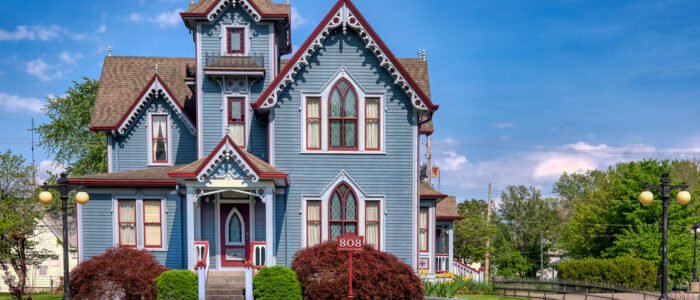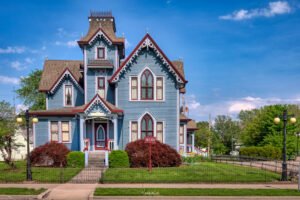
Introduction
Homeownership is a dream for many people around the world, and it represents financial stability, security, and the freedom to personalize your living space. While buying a house is an exciting process, it’s crucial to understand the cultural, economic, and legal differences between countries before making a decision. In this article, we will explore the similarities and differences between purchasing a house in America and Nigeria, examining factors such as property rights, financing options, and real estate markets.
- Property Rights and Legal Framework
America: In the United States, property rights are well-established and protected by law. Buyers can have confidence in the legal system when purchasing a home, as there are clear processes and regulations in place. The title deed system ensures that property ownership is secure and can be easily verified. Additionally, the United States has a robust legal system to resolve any disputes that may arise during the home buying process.
Nigeria: On the other hand, Nigeria has a more complex and less transparent legal framework regarding property ownership. Nigeria’s land administration system is governed by the Land Use Act of 1978, which vests control of land in the hands of the government. Individuals and companies can only obtain a Certificate of Occupancy, granting them a 99-year lease. This system has led to widespread bureaucratic inefficiencies, making the process of obtaining land rights and title documentation challenging and time-consuming.
- Financing Options
America: The United States has a well-developed mortgage market that offers numerous financing options for homebuyers. These include conventional loans, Federal Housing Administration (FHA) loans, Veterans Affairs (VA) loans, and United States Department of Agriculture (USDA) loans, among others. These options cater to various income levels and credit scores, making it easier for prospective buyers to find a suitable mortgage. Interest rates in the United States are relatively low, and the mortgage approval process is generally efficient and transparent.
Nigeria: Nigeria’s mortgage market is less developed and can be more challenging for prospective homebuyers to navigate. The Central Bank of Nigeria regulates mortgage lending, and while there are some government-backed mortgage schemes, they tend to have strict eligibility requirements. Interest rates for mortgages in Nigeria are generally higher than in the United States, and the loan-to-value ratio (LTV) is usually lower, requiring larger down payments. Additionally, the mortgage approval process can be lengthy and complex, which can deter potential homebuyers.
- Real Estate Market Dynamics
America: The United States has a diverse real estate market, with a wide variety of property types and price ranges. Home prices vary significantly depending on the location, with major cities like New York and San Francisco commanding higher prices than rural areas. The US real estate market has a relatively high level of transparency, and there are numerous resources available, such as online listings, real estate agents, and appraisers, to help buyers make informed decisions.
Nigeria: The Nigerian real estate market is also diverse but tends to be more fragmented and less transparent than its American counterpart. Lagos, Nigeria’s largest city, has a booming real estate market with rising property prices. However, the lack of reliable data and the prevalence of informal transactions can make it difficult for buyers to assess property values accurately. To navigate the Nigerian market, it’s crucial to work with a trusted real estate agent and conduct thorough due diligence.
- Costs and Fees
America: In the United States, homebuyers can expect to pay various fees and closing costs, such as appraisal fees, loan origination fees, and title insurance. These costs typically amount to 2-5% of the home’s purchase price. Property taxes in the US vary by state and local jurisdiction, and they can have a significant
impact on the total cost of homeownership. Additionally, homeowners in the United States are typically required to carry homeowner’s insurance, which further adds to the overall cost of owning a home.
Nigeria: In Nigeria, homebuyers also need to consider several costs and fees when purchasing a property. These include legal fees, survey fees, and stamp duties. The Land Use Act imposes a consent fee, which is payable to the state government for the transfer of property rights. Furthermore, property taxes in Nigeria, known as tenement rates, are levied by local governments and vary based on the property’s location and value. Homeowners in Nigeria are not required to have insurance, but it is highly recommended due to potential risks such as flooding and fire.
- Infrastructure and Amenities
America: The United States generally has well-developed infrastructure and amenities, such as good quality roads, public transportation systems, reliable electricity, and water supply. American homes often come with modern amenities and conveniences, including central heating and cooling systems, modern appliances, and internet access. Additionally, homebuyers in the US have access to a wide variety of services, such as schools, healthcare facilities, shopping centers, and recreational facilities.
Nigeria: Infrastructure and amenities in Nigeria can vary greatly depending on the location. Urban areas like Lagos and Abuja typically have better infrastructure and more amenities compared to rural areas. However, even in major cities, challenges such as traffic congestion, unreliable electricity supply, and inadequate water supply persist. Nigerian homes may not always come with the same modern amenities found in American homes, and homebuyers may need to invest in additional upgrades, such as installing backup power generators or water treatment systems.
- Cultural Considerations
America: The United States is a melting pot of cultures, which can be an advantage for homebuyers seeking a diverse and inclusive community. American neighborhoods often have a mix of architectural styles and housing types, catering to various preferences and budgets. When purchasing a home in the US, buyers should consider factors such as proximity to work, schools, and amenities that are essential to their lifestyle.
Nigeria: Nigeria is a diverse country with over 250 ethnic groups and various cultural practices. Homebuyers in Nigeria should be aware of local customs and traditions that may influence the design and layout of homes, as well as the overall community environment. In Nigeria, it is common for extended families to live together, so homes are often designed with larger living spaces and multiple bedrooms to accommodate family members. When buying a home in Nigeria, consider factors such as proximity to your family, workplace, and essential amenities.
Conclusion
In conclusion, the decision to purchase a home in America or Nigeria depends on various factors, such as personal preferences, financial resources, and long-term goals. While both countries offer unique opportunities and challenges, the United States generally has a more transparent and accessible real estate market, with better infrastructure and amenities. On the other hand, Nigeria’s real estate market is rapidly developing and can offer potential growth and investment opportunities, albeit with higher risks and more complex procedures.
Ultimately, prospective homebuyers should carefully consider their individual needs and priorities and conduct thorough research and due diligence before making a decision. Working with experienced real estate professionals, familiar with the local markets and regulations, can significantly ease the home buying process and ensure a successful outcome.
Add on: Buying a house early in your working years in America, will increase your ability to buy a second home in Nigeria as you get older.
“This piece was generated with the help of the Chat GPT language model from Open AI.”